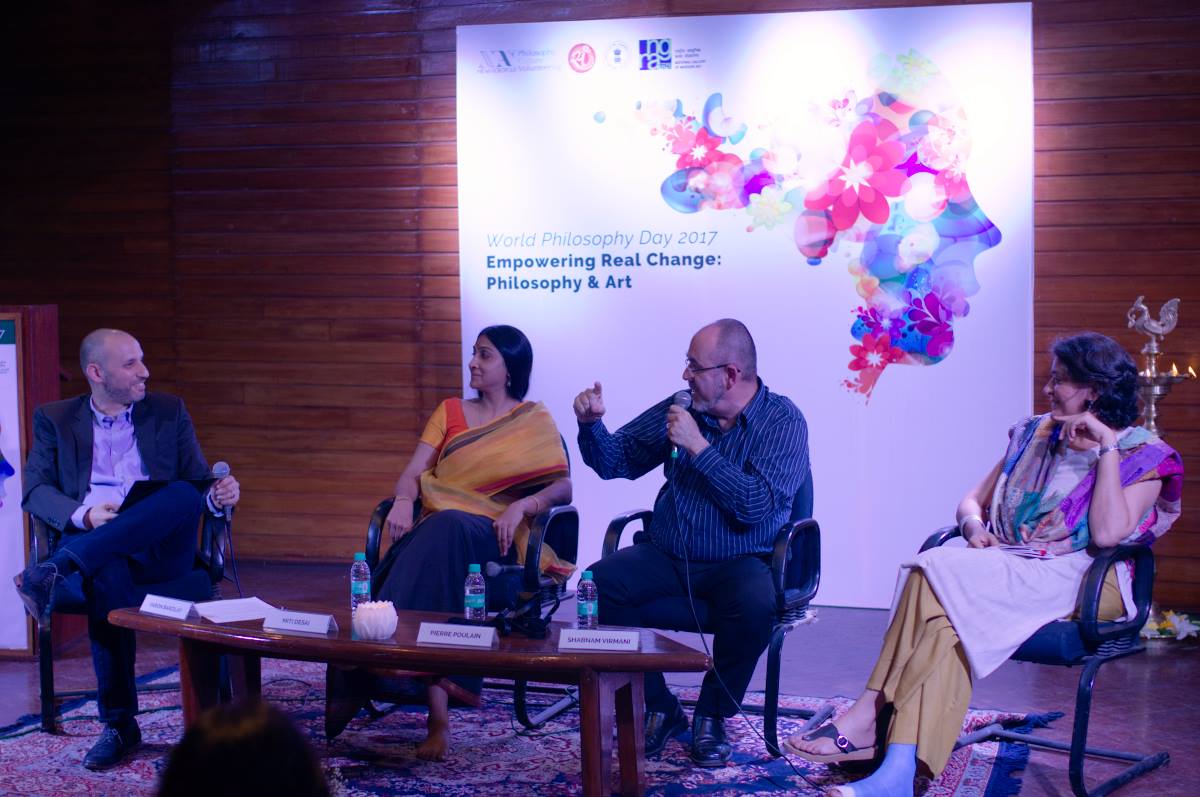Re-Humanizing Corporate Culture
Article By Vasant Sanzgiri
 Most people working in organizations are familiar with the Human Resources Department. It is the single point of contact for an employee – through the processes of Recruitment, On-boarding, Training, Integration, Appraisals, Growth, and even the Exit Interview. Since the HR Dept comprises a team of people that interacts with employees, it would seem appropriate to expect that they would demonstrate a natural sensitivity towards each individual in the organization. But is this really the case? It is ironic that HR, instead, is seen as the ‘baddy’ in the organization, creating bottlenecks, and being insensitive towards fellow employees and their issues. Why does this happen? Are the HR folk not ‘human’? Are they not employees as well? Why does this split personality seem to characterize HR Departments?
Most people working in organizations are familiar with the Human Resources Department. It is the single point of contact for an employee – through the processes of Recruitment, On-boarding, Training, Integration, Appraisals, Growth, and even the Exit Interview. Since the HR Dept comprises a team of people that interacts with employees, it would seem appropriate to expect that they would demonstrate a natural sensitivity towards each individual in the organization. But is this really the case? It is ironic that HR, instead, is seen as the ‘baddy’ in the organization, creating bottlenecks, and being insensitive towards fellow employees and their issues. Why does this happen? Are the HR folk not ‘human’? Are they not employees as well? Why does this split personality seem to characterize HR Departments?
The genesis of this conundrum goes back to the post-industrial revolution era, with the birth of the idea that human beings are considered resources, cogs in the wheels of the industrial and economic machine, as introduced by Adam Smith in his seminal work The Wealth of Nations. Smith mentions, “the most important substantive proposition in all of economics is that, under competition, owners of resources (for example labour, land, and capital) will use them most profitably…”. People, here described as labour, are just another resource to be used as a tool to generate profit. After a series of many euphemistic iterations such as “Staff Welfare”, or “Personnel Management”, Smith’s work might have given rise to the term most widely used today: Human Resources.
Resources are company assets that must be maintained, cataloged, and put to efficient use in a way that they prove their worth. Each machine in a production unit is meant to perform a specific task. When it doesn’t function properly it is repaired, or replaced; every resource, therefore, is expendable. When people are looked at as resources, they too are dehumanized and treated like machines when they don’t perform as expected; their personal circumstances, emotional cycles, and external obligations are blind-sighted. Furthermore, people begin to see themselves as simple cogs, assigned to mechanical functions; and rather than contribute towards their full potential, they do just enough to get away with, without getting fired!
I believe human beings are the most evolved beings on the planet. The esoteric tradition offers that the complexity of our physical form is but a manifestation of an evolved spiritual consciousness. We have complex emotional, physical, and mental systems that must be understood and nurtured in order to facilitate our ultimate goal of self-actualization. Maslow in his seminal work on the Hierarchy of Needs identified the natural needs experienced by all human beings regardless of social, racial, or economic context. The highest need, or motivation, he speaks of is the need for self-actualization. Perhaps this can be described as the need to fulfill one’s potential. Evidently, most organizations seem simply to fulfill the lower needs of its employees – with financial compensation to satisfy the most basic physiological needs, and sometimes medical/life insurance that might address the security needs. The pursuit of higher needs takes a back seat.
Let’s examine the collateral damage of this treatment. Fearful of losing one’s livelihood, at a company that demands 100%, may sometimes result in neglect on the home front, and threatens the fabric of the family unit. Time spent with the family, or with the community reduces significantly. Children see their parents mostly over the weekends – parents are asleep when the child goes to school, and the child is already asleep when the parents return home.
The resulting guilt is dealt with by meeting unreasonable demands of the child instantly and disproportionately. For example, aspirational vacations are characterized by exotic locations and five-star hotels. Values are imbibed through television programs or left at the behest of babysitters and neighbours, who may lack the genuine concern for the child’s wellbeing. All this inculcates an ethical code far removed from those of earlier generations; a culture of instant gratification that becomes the dominant value system that shapes young individuals, which affects expectation in all aspects of life, including from the organization they work in.
But what if there the HR department in organizations ensure a work-life balance we might revive the idea of holidays as the annual opportunity to spend time with Grandparents, cousins, and the extended family? In my youth, I remember it had facilitated the assimilation of culture and values, unique to each family or community.
Many organizations perpetrate and perpetuate the give-100% culture, showing little concern for the natural need for self-actualization. But this previously popular profit-focused paradigm that neglects to nurture individual potential, and fails to value the higher needs of individuals, is now facing a crisis. According to a Gallup Poll, only 31.5% of U.S. employees are engaged and thriving. Yet the corollary to that fact is not that the others are lazy, but that perhaps their disconnectedness stems from feeling unsupported and disempowered at work. They don’t feel valued, and have no clear direction and purpose.
However, things are changing. The IT revolution is at the forefront of creating new kinds of jobs and the competition to hire the best talent available in the market has intensified. This has led to people having more job options, placing them in a position to ask for what they want; more control over their time, flexible hours, the option to work from home, a work-life balance…in short ,they want to work for companies that invest in their development – not just technical, but development as a human being.
All this points to the inherent pull an individual has to fulfill other, higher needs. Organizations that respond to this need succeed in creating an inspiring work environment that wins the respect and loyalty of its workforce. To operate under the conventional wisdom that most people work for money alone, and hence incentivize them with huge bonuses and salary packages, is both short-sighted and shallow.
To enable them to innovate, to be their most creative and productive selves, employees need to be motivated by demonstrating that their work is meaningful, and that it is connected to a common, higher purpose. When organizations can acknowledge employees’ strengths and support their growth, employees are motivated to perform to the best of their potential, benefiting all those around him in an ever-widening ripple effect; the family, community, society.
Re-humanizing Business
Setting goals towards profitability and shareholder value is a necessary part of any business strategy. But does this necessarily need to be at odds with the need to support human values? Vineet Nayar of HCL Technologies shares from his experience that when people feel that their efforts are supported by the management’s desire to see them succeed, they will be naturally aligned with achieving success. Employees should be treated as partners in generating economic activity. Unlike resources like fixed assets, people increase in value through support and recognition. No price can be attached to their human effort, loyalty, and innovative drives! The new mantra doing the rounds is, “Employees [not customers] First!”
Another way to deal with this issue lies in understanding the reasons why some people are super successful. How do those who have achieved honour and esteem in their profession create an almost spiritual experience for themselves and for those who work with them? Let’s look at different walks of life – musicians, artists, dancers, athletes who have excelled in their field. Has money been a motivator for them to achieve excellence? At best, money is a tool, a means, but can never be the goal. At a musical or dance performance, a truly devoted artist performs for his/her love for the art, with little consideration of material benefit, and strives to take the audience into a magical real. It has often been said that Tendulkar never played for money; he loved the sport and all he wanted was to excel at it!
Some Japanese companies are an excellent example of recognising and addressing the human needs of its employees. The work day in some such companies begins with physical exercises. Emphasis is laid on the importance of planning the work efficiently, to avoid unreasonable timelines and stressful deliverables. Opportunities are created to foster sharing of feelings and experiences. The value of keeping the workplace clean and tidy is deliberately fostered, as is respect for all the tools and equipment. Results are measured against agreed standards, and small improvements are continuously acknowledged.
As an HR professional, I believe that fulfilment in the workplace starts by engaging with team members, and motivating them towards a shared collective purpose, beyond profit…for example, a construction company that honestly claims, “Work with us to build our nation!” Valuing their opinions and personal needs, and supporting their efforts so they are engaged with their work further contributes. Human resource functions including hiring, transitioning, training, and communication, when aligned to the above philosophy, might consistently give employees the tools to succeed in which ever job they do, making sure that people are in the most suited positions. Instead of being concerned about the cost for training and updating practices, we need to consider the cost of under-utilising or losing valuable employees. Doing HR right translates to gratified employees, motivated with the freedom to communicate and innovate, facilitating a cooperative community, rather than a competitive race. I suspect this might result in happier employees, lower personnel turnover, and a better return on investment for the organization – all likely to result in satisfied customers and growth for the business. It’s a win for all concerned.
Organizations, especially the HR function, can play a pivotal role in culture building, inculcating a work ethos that highlights the collective spirit for which each person works, and must actively participate in the development of employees. In doing so, we can make an enormous contribution to the development of society. Perhaps it is our obligation to our planet that we invest in human development. This is true Corporate Social Responsibility. It can be done, and it must be done
Image Credits: By thetaxhaven | Flickr | CC BY 2.0
The entity posting this article assumes the responsibility that images used in this article have the requisite permissionsImage References
By thetaxhaven | Flickr | CC BY 2.0
Permissions required for the publishing of this article have been obtained
Article References
Smith, Adam. Wealth of Nations. W. Stahan and T. Cadell. London (1776). 2. Nayar, Vineet. Employees First. Harvard Business Review Press. (2010). 3. Pfeil, Scott. Treating Humans as a Valuable Resource, a COO’s perspective. Letsbackflip.com. (March 2016). < https://www.letsbackflip.com/2016/03/treating-humans-as-a-valuable-resource/> 4. Aston, Louise. Employees must be treated as human beings not 'doings'. (April 2013). < http://www.bitc.org.uk/blog/post/employees-must-be-treated-human-beings-not-doings>




What do you think?